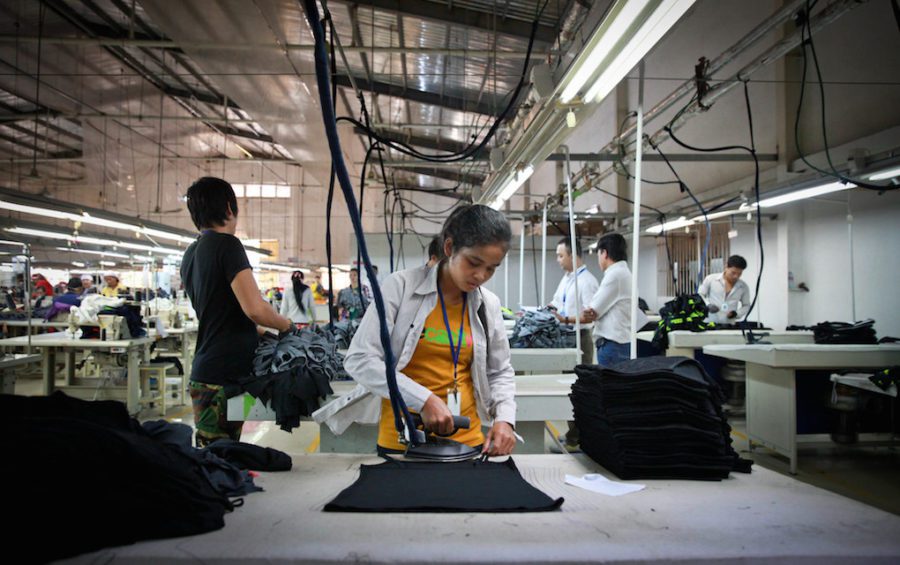With sinking exports and suspended production lines, the garment industry and a labor union continued appeals for help from the government and others this week, respectively renewing calls for a delayed partial withdrawal of trade benefits and quicker processing of worker payouts.
The garment sector, Cambodia’s largest employer, has lost more than 150,000 jobs, or about 15 percent of the industry’s labor force, and faced some 400 factory suspensions, “with scores more factories and tens of thousands of additional workers at imminent risk,” the Garment Manufacturers Association in Cambodia (GMAC) said this week.
The Labor Ministry said on Thursday that it was processing worker suspension payments for 30,189 workers from nearly 100 factories and tourism enterprises. According to a ministry notice, the government has distributed payments to out-of-work workers 12 times since May.
In April, Prime Minister Hun Sen announced that the government would pay $40 per month to garment and tourism workers whose employers had registered their companies’ suspension with the Labor Ministry. The government also requested that employers pay workers $30 per month while they were suspended.
As the ministry promised new payments were coming, the Cambodian Confederation of Unions (CCU) on Thursday urged the premier to intervene and provide payments to workers more quickly to lessen their financial burden during the pandemic-driven economic downturn.
In an open letter, CCU claimed that workers had only received $20 from the government after their work was suspended for more than two months.
“CCU asks the government to pay the full amount of money to workers in order to make it easy for them to spend on relieving debts and their livelihoods,” said the letter, which was signed by CCU president Rong Chhun.
Ouk Chanthou, head of the Labor Ministry’s inspection department, told VOD last week that the government processes Covid-19 recovery payments to workers twice a month, adding that it takes time to distribute the money via a private bank.
“The Labor Ministry issued letters [granting permission for] suspension, the proper number of workers with clear names and phone numbers, and proper identification cards,” Chanthou said.
“The Labor Ministry will hand [the money] over to the Finance Ministry, which will provide it to Wing. Wing will get the list of workers that were suspended, then they will drop the money to workers,” he said, referring to the electronic money transfer firm.
Cambodia exported $3.7 billion of clothes, footwear and travel goods in the first quarter, a 5 percent drop compared to the same period last year, according to state news outlet AKP.
The World Bank in May projected that Cambodia will experience negative growth this year for the first time since 1994 due to economic losses during the pandemic. The World Bank said that the poverty rate would sharply increase if workers from the largest job sectors — tourism, retail, garments, construction and manufacturing — experience months of unemployment without sufficient government assistance.
As exports remain low during the global slowdown, garment factories are seeking reprieve from potential hits to factories’ bottom lines: annual minimum wage negotiations and the partial withdrawal of Cambodia’s duty-free trade access to the E.U.
In a letter to the Labor Ministry last month, GMAC asked to delay minimum wage talks, which are set to run from this month through September, until the sector “returns to its normal position.”
The association said the government could lawfully delay negotiations due to an “act of God or any necessary case,” which would keep the minimum wage at its current rate.
“Delaying the minimum wage negotiations will be a mechanism to support the sector to stay alive as well as maintain employment for workers,” GMAC said.
In another statement released by the industry group on Wednesday, GMAC asked the International Labor Organization (ILO) and European buyers to support the association’s call for the European Commission to reassess and postpone for one year its decision to partially withdraw Cambodia’s “Everything But Arms” (EBA) trade benefits to allow the industry time to recover from the economic downturn.
The Commission announced in February that it would remove trade perks for some products due to “serious and systematic” human rights violations in Cambodia.
In a joint appeal in early June, GMAC, the Cambodia Footwear Association (CFA) and European Chamber of Commerce in Cambodia urged the E.U. to stall the EBA withdrawal, which is slated for next month.
In a letter dated June 30, the groups thanked Bernd Lange, chair of the European Parliament’s International Trade Committee, for responding to the initial appeal made by the groups in early June.
A European Commission press officer for trade told VOD in early June that the Commission may review its decision on Cambodia’s EBA status and reinstate trade preferences if “Cambodia shows significant progress, notably on civil and political rights.”
The industry groups urged E.U. officials to consider the needs of workers and factories before the withdrawal of some EBA benefits goes into effect on August 12.
“Our factories and workers have suffered enormously from the pandemic, and many are trying to survive until demand, hopefully, resumes in 2020,” CFA’s secretary general Ben Kao said in a statement. “A second blow from the withdrawal of EBA benefits could be a second blow that most factories will not be able to sustain.”
Additional reporting by Sam Oudom
(Translated and edited from the original article on VOD Khmer)













